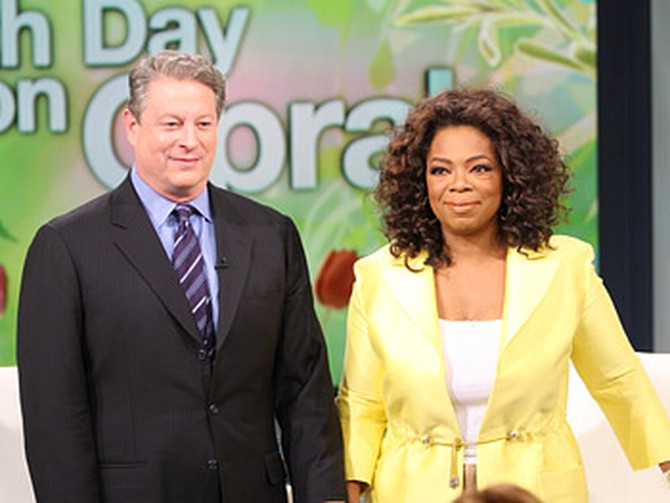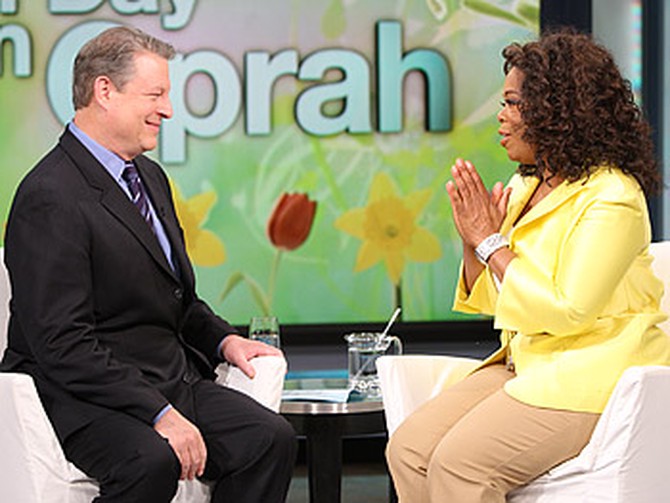Al Gore's Eco Campaign

When former Vice President Al Gore turned a lecture about the climate crisis into a documentary called An Inconvenient Truth, he encouraged millions to make earth-friendly changes in their lives and his efforts paid off. The film won the Oscar® for Best Documentary.
In 2007, his tireless efforts to educate the world about global warming were celebrated on an international scale. He was awarded the Nobel Peace Prize alongside the United Nation's Intergovernmental Panel on Climate Change.
"It felt great," he says. "Not least because some people who weren't willing to listen before, some of the people in that group really began to open up and listen a little bit more."
Though leaders are starting to listen to Gore's urgent warnings, he says the world is still at risk. "We're still dumping 70 million tons of global warming pollution into the earth's atmosphere every day," he says. "Vindication would be when we really stop doing that and turn the corner, but the exciting, positive news is that there are a lot of good changes under way now."
In 2007, his tireless efforts to educate the world about global warming were celebrated on an international scale. He was awarded the Nobel Peace Prize alongside the United Nation's Intergovernmental Panel on Climate Change.
"It felt great," he says. "Not least because some people who weren't willing to listen before, some of the people in that group really began to open up and listen a little bit more."
Though leaders are starting to listen to Gore's urgent warnings, he says the world is still at risk. "We're still dumping 70 million tons of global warming pollution into the earth's atmosphere every day," he says. "Vindication would be when we really stop doing that and turn the corner, but the exciting, positive news is that there are a lot of good changes under way now."

In 2008, Gore pooled his personal funds, donations and the Nobel Prize cash award to launch a new campaign. Though he's spent most of his career running for political office, this campaign has nothing to do with delegates or debates.
This $300 million advertising effort features unlikely pairs like the Rev. Al Sharpton, a leading liberal voice, and Pat Robertson, the conservative founder of the Christian Broadcasting Network. The wecansolveit.org commercials' messages are that if citizens join together, we can solve the climate crisis.
"It's bipartisan. Newt Gingrich and Nancy Pelosi have joined together—a lot of unlikely alliances," Gore says. "[We're] making the point that this is not a political or partisan issue. This is an ethical issue. It's a moral issue. We all want a good, bright future for our children, and that means that we have to take responsibility for making the changes that are necessary now."
Gore says it's time for people to put pressure on elected officials who have the power to pass eco-friendly legislation. "We, as citizens, have to take action. It's important to change the lightbulbs," he says. "It's even more important to change the laws."
This $300 million advertising effort features unlikely pairs like the Rev. Al Sharpton, a leading liberal voice, and Pat Robertson, the conservative founder of the Christian Broadcasting Network. The wecansolveit.org commercials' messages are that if citizens join together, we can solve the climate crisis.
"It's bipartisan. Newt Gingrich and Nancy Pelosi have joined together—a lot of unlikely alliances," Gore says. "[We're] making the point that this is not a political or partisan issue. This is an ethical issue. It's a moral issue. We all want a good, bright future for our children, and that means that we have to take responsibility for making the changes that are necessary now."
Gore says it's time for people to put pressure on elected officials who have the power to pass eco-friendly legislation. "We, as citizens, have to take action. It's important to change the lightbulbs," he says. "It's even more important to change the laws."

When Oprah turns on the television, she says she sees a lot more "green" products being advertised. "Green is what 'no carbs' were five years ago," she says.
Though this is a sign of real progress, Gore warns consumers to be wary of something environmentalists call "greenwashing."
"There are some advertisements and promotions that make it seem as if there's progress when actually, underneath, the substance is not changing that much," he says.
Oprah credits Gore with making many people more aware of the world and how to help conserve its limited resources. "Thank you for walking the walk," she says.
See how Gore renovated his home to make it energy-efficient.
Though this is a sign of real progress, Gore warns consumers to be wary of something environmentalists call "greenwashing."
"There are some advertisements and promotions that make it seem as if there's progress when actually, underneath, the substance is not changing that much," he says.
Oprah credits Gore with making many people more aware of the world and how to help conserve its limited resources. "Thank you for walking the walk," she says.
See how Gore renovated his home to make it energy-efficient.
Published 01/01/2006

